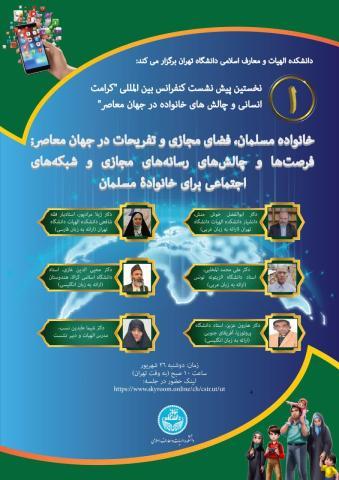
As part of the International Conference on “Human Dignity and Family Challenges in the Contemporary World,” the fifth pre-conference session, titled “The Muslim Family, Virtual Spaces, and Leisure in the Contemporary World: Opportunities and Challenges of Digital Media and Social Networks for Muslim Families,” was held with the cooperation of the conference secretariat and the Faculty of Theology and Islamic Studies at the University of Tehran.
This pre-session received widespread interest from students and was held in three languages: Persian, English, and Arabic.
At the beginning of the session, Dr. Jila Moradpour (Assistant Professor, Shafi’i Jurisprudence, Faculty of Theology, University of Tehran) addressed the topic “Family and the Virtual Space.” She discussed the challenges and harms of virtual spaces, emphasizing solutions such as media literacy education from childhood, strengthening social interactions, developing Iranian-Islamic content, and developing parenting and marital skills to counter these challenges.
Following this, Dr. Ali Mohammad Al-Makhbili (Professor, University of Ez-Zitouna, Tunisia) presented his paper in Arabic, titled “Dignity and Freedom in the Face of Digital Globalization.” He stressed that human dignity is synonymous with freedom, which, in essence, means absolute moral and rational laws. Professor Al-Makhbili proposed two strategies for resisting the harms of virtual space: 1) governmental actions, and 2) family measures, such as educating children, setting rules, and promoting values.
The third speaker was Dr. Abolfazl Khoshmanesh (Associate Professor, Faculty of Theology, University of Tehran), who presented his paper in Arabic, titled “The Role of the Home and Woman in the Medinan Surahs of the Qur’an (Examples from the Surahs: Ahzab, Nur, Talaq, Tahrim, Mujadila, Mumtahina).” In his conclusion, he highlighted that in the Islamic civilization envisioned by the Qur’an, the role of women in family upbringing holds great importance.
The fourth speaker, Dr. Mohiyuddin Ghazi (Professor, Islamic University of Kerala, India), presented his paper titled “Islamic Family Values and Their Role in Family Preservation and its Happiness.” Based on Quranic texts, he concluded that mutual understanding between spouses is often overlooked. Both the husband and wife should be satisfied with one another. He highlighted 18 values presented in the Qur’an that foster a happy life and a virtuous society.
The final speaker, Dr. Harun Aziz (Professor, University of Pretoria, South Africa), spoke on the topic “The Muslim Family, Digital Space, and Entertainment in the Contemporary World,” outlining the opportunities and challenges that digital media and social networks present for Muslim families.
It is noteworthy that the speeches were translated into two languages. At the end of the session, participants and attendees had the opportunity to ask questions from the speakers.







